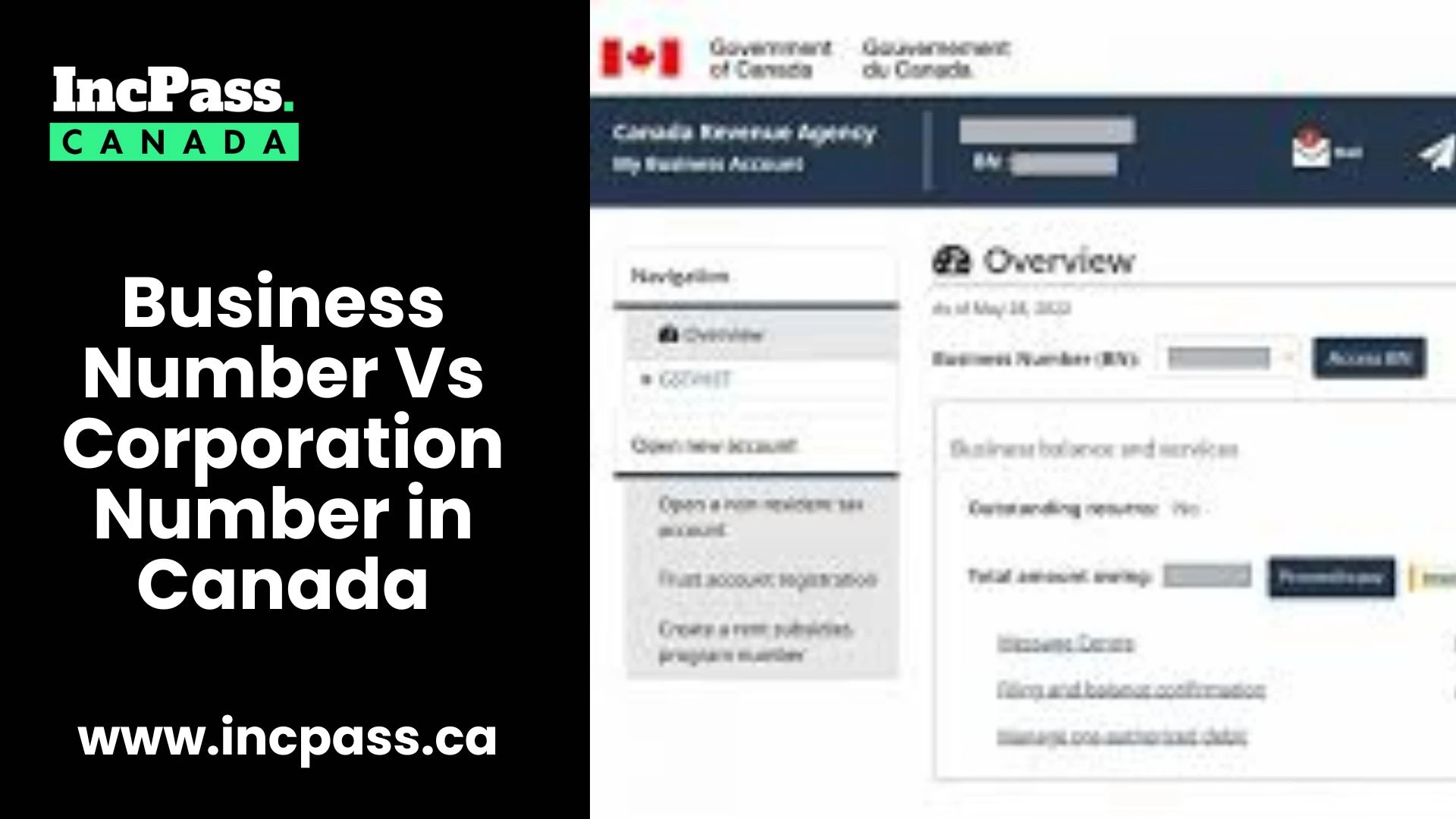In the decisive environment of the growing Canadian business, where lots of entrepreneurs register their businesses in Canada, understanding and complying with legal regulations can be a very exhausting task. No matter whether you are an experienced entrepreneur or a newcomer in the business field, understanding the difference between a Business Number (BN) and a Corporation Number is crucial.
Did you know that as of 2024, over 3.26 million businesses were registered in Canada? Yet, a significant portion of these entrepreneurs often find themselves puzzled by the divergent functions and implications of these two essential identifiers. While both are indispensable for operating within the Canadian economic framework, their purposes and applications diverge significantly.
In this article, we will learn about the difference, roles and significance of a business number and a corporation number. Let’s get started.
What is a Business number in Canada?
Business Number (BN) in Canada serves as a unique identifier assigned by the Canadian Revenue Agency (CRA) to businesses and organizations operating within the country. It acts as a central point of reference for various interactions with government agencies, including taxation, payroll, import/export activities, and other regulatory requirements. The BN system streamlines administrative processes by providing a single identification number for businesses to use when dealing with multiple government departments and agencies. Essentially, the BN functions as a foundational element for businesses to establish their presence and engage in lawful activities within the Canadian economic landscape.
Significance of a Business Number
- Taxation and Compliance: The BN is crucial for businesses to meet their tax obligations, including income tax, goods and services tax/harmonized sales tax (GST/HST), payroll deductions, and corporate taxes. It ensures accurate reporting and compliance with Canadian tax laws.
- Government Interactions: With a BN, businesses can interact with various government departments and agencies more efficiently. Whether it’s applying for permits, licenses, or accessing government programs and benefits, the BN streamlines administrative processes.
- Import/Export Activities: For businesses engaged in international trade, the BN is essential for customs clearance and obtaining import/export permits. It enables seamless transactions and compliance with trade regulations.
- Employment and Payroll: Employers use the BN when remitting payroll deductions, such as income tax, Canada Pension Plan (CPP), and Employment Insurance (EI) contributions for their employees.
- Legal and Financial Transactions: Banks, financial institutions, and other entities often require a BN for opening business accounts, obtaining loans, and conducting financial transactions. It establishes credibility and facilitates business operations.
Role of a Business Number
- Unique Identifier: The BN provides each business with a distinct identification number, allowing government agencies, financial institutions, and other entities to easily identify and differentiate businesses.
- Taxation: It serves as the primary identifier for tax purposes, enabling businesses to fulfill their tax obligations accurately. This includes reporting income tax, goods and services tax/harmonized sales tax (GST/HST), payroll deductions, and other taxes to the Canada Revenue Agency (CRA).
- Regulatory Compliance: The BN ensures businesses comply with various regulatory requirements, such as licensing, permits, and certifications. It streamlines interactions with government bodies by providing a unified identifier for regulatory purposes.
- Government Transactions: Businesses use the BN when engaging with government departments and agencies for a wide range of activities, including applying for grants, accessing government programs, and submitting regulatory filings.
- International Trade: For businesses involved in import/export activities, the BN is essential for customs clearance, obtaining permits, and complying with international trade regulations. It facilitates smooth transactions and ensures adherence to trade laws.
- Financial Transactions: Banks and financial institutions require the BN for opening business accounts, obtaining credit, and conducting financial transactions. It enhances credibility and facilitates financial operations.
What is the Corporation Number in Canada?
A Corporation Number in Canada is a unique identifier assigned to corporations by the federal or provincial/territorial government at the time of incorporation. It serves as a distinct reference code for each registered corporation, facilitating official recognition and legal status within the Canadian business framework. The Corporation Number is essential for conducting various corporate transactions, including opening bank accounts, entering contracts, and filing taxes. It also enables regulatory bodies to track and monitor corporate activities, ensuring compliance with relevant laws and regulations. Essentially, the Corporation Number is a foundational element of corporate identity in Canada, providing a clear and official marker of a corporation’s existence and legal standing.
Significance of a Corporation Number
- Legal Identity: The Corporation Number establishes a corporation’s legal identity, distinguishing it as a separate legal entity from its shareholders. This distinction is vital for liability purposes and legal recognition in contractual agreements and disputes.
- Regulatory Compliance: It ensures compliance with government regulations governing corporations. This includes filing annual returns, maintaining corporate records, and adhering to corporate governance standards set by federal or provincial/territorial authorities.
- Business Transactions: The Corporation Number is essential for conducting business transactions, including opening bank accounts, entering contracts, and engaging in commercial activities. It provides credibility and transparency in business dealings.
- Taxation: Corporations use the Corporation Number for tax purposes, including filing corporate income tax returns and claiming tax credits or deductions. It enables accurate reporting of corporate finances to tax authorities.
- Public Record: The Corporation Number is part of the public record, allowing stakeholders, investors, and interested parties to verify a corporation’s legal status and history. It enhances transparency and facilitates due diligence in business relationships.
Difference Between Business Number vs Corporation Number in Canada
| Aspect | Business Number (BN) | Corporation Number |
| Issuing Authority | Canada Revenue Agency (CRA) | Federal or provincial/territorial authorities |
| Purpose | Taxation, government interactions | Legal identity, regulatory compliance, business transactions |
| Applicable Entities | Various business types (sole proprietorships, partnerships, corporations) | Specifically for corporations |
| Usage | Tax filing, permits, government programs | Regulatory compliance, business transactions, legal recognition |
| Legal Implications | Does not confer legal status or identity upon the business entity | Signifies legal existence and identity of a corporation as a separate legal entity |
Final Thoughts
Difference between the Business Number (BN) and Corporation Number in Canada is crucial for businesses to navigate regulatory requirements effectively. While the BN, issued by the Canada Revenue Agency, is primarily for taxation and government interactions and applies to various business structures, the Corporation Number, assigned at incorporation, signifies the legal identity of corporations. Understanding these differences is vital for compliance and transparent operations in the Canadian business landscape, ensuring businesses can establish a strong foundation for growth and success.
Contact IncPass Canada Today!
Frequently Asked Questions
Why Businesses in Canada require a business number and a corporation number?
A corporation number is essential for businesses to conduct operations legally, granting them rights akin to natural persons, including the ability to enter contracts, own property, and sue. It serves as a crucial identifier, distinguishing one business from another on legal documents like contracts and invoices. Additionally, government agencies, like the Canada Revenue Agency (CRA), use business numbers for tax purposes, tracking income tax, GST/HST returns, and import/export activities. Having a business number streamlines tax processes, allowing businesses to use it for future returns, even with name changes. Businesses can apply for a CRA business number online or by phone.
Is Business Number equivalent to Corporation Number in Canada?
No, the Business Number (BN) is not equivalent to the Corporation Number in Canada. While both are unique identifiers for businesses, they serve different purposes and are applicable to different types of entities. The Business Number, issued by the Canada Revenue Agency (CRA), is used primarily for taxation purposes and government interactions. It applies to various business structures, including sole proprietorships, partnerships, and corporations. On the other hand, the Corporation Number is specifically assigned to corporations by federal or provincial/territorial authorities at the time of incorporation. It signifies the legal existence and identity of the corporation, facilitating regulatory compliance, business transactions, and legal recognition. Therefore, while both numbers are important for businesses, they are distinct and serve different functions within the Canadian business landscape.








